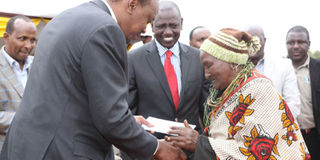Breaking News: At least 10 feared to have drowned in Makueni river
To move on, Kenya must confront past demons

President Uhuru Kenyatta (left) and his Deputy William Ruto (centre) during a function where IDPs were given funds for re-settlement in September 2013. PHOTO | FILE |
What you need to know:
- The current preference in Kenya for amnesia has brought temporary relief from a divisive history that is easier to forget than debate, but the price paid is the sporadic recurrence of violence.
- Flanagan’s novel is as much about memory as it is about the events described.
- Institutions such as Parliament, the local courts and the ICC, have not been up to the job given to them in 2008 due to a lack of political will.
Last week in London, Richard Flanagan, an Australian novelist, was awarded this year’s Man Booker prize.
Flanagan won the most prestigious annual British award for the best novel written in the English language, for his book “The Narrow Road to the Deep North”.
The book is based on the experience of his father as a prisoner-of-war in Japanese captivity in South East Asia during the Second World War.
Flanagan’s novel is as much about memory as it is about the events described. It is an attempt to give a voice to his father’s experiences – the deaths of comrades, torture, starvation, disease and forced labour in inhospitable conditions - that were too dreadful for him to discuss with his son after the war had ended.
Like so many people that have lived through immense trauma, Flanagan’s father had little choice but to forget. As the novelist wrote in a webchat on The Guardian’s website last week, ‘man survives by his ability to forget.’ Flanagan’s father had to forget in order to return to an ordinary life of family and work.
We all try to forget shameful or painful experiences in our own lives; recollection of them brings a shudder and an immediate attempt to think more positive thoughts. If we did not forget, then we would be permanently paralysed by guilt, embarrassment or grief.
In this regard societies and nations are no different from individuals. For centuries, Britain for example, actively forgot the heinous crimes committed on its slave ships and in its colonies so it could continue to maintain its empire. Indeed, that amnesia was prolonged after the end of the empire to allow for a continued interventionist foreign policy.
Collective amnesia is not always such a cynical political activity. When doing research on the Mau Mau period, both during interviews and my work in the archives, I was consistently struck by the determination of victims and witnesses of appalling atrocities – most commonly committed by or on the orders of my compatriots – to get on with their lives after independence.
But Flanagan’s book is not a manifesto for collective amnesia. As well as acknowledging that forgetting the past is sometimes necessary, the book also shows how there are moments at which the past needs to be confronted.
In Flanagan’s case this was his father’s advancing years; poignantly his father died on the day Flanagan finished writing the book. Flanagan recognised that he needed to write this book if his father’s experiences were not to be forever lost.
As Flanagan argues, ‘freedom exists in the space of memory, and at a certain point we all need to advance back into that shadow in order to be liberated.’ We can only hide from the past for so long.
Societies and nations are forced to confront their forgotten histories on a far larger scale and rarely at a moment of their own choosing. In early 2008 it seemed as if Kenya was at such a juncture. The post-election violence provoked a burst of introspection: how had it come to this?
The political settlement that followed included substantial efforts to remember: The Waki Commission, the Truth, Justice and Reconciliation Commission, the promises of prosecutions, even the new Constitution was framed around a historical understanding of what had gone wrong in the past.
CAUGHT IN CONTROVERSY
But what is left of this burst of remembering? The Waki Commission’s report was caught up in the controversies surrounding the ICC. Nothing more need be said about the ICC cases; no other prosecutions are forthcoming either. The TJRC report has been buried and the new Constitution embroiled in petty disputes.
The advance back into the shadow of memory has been halted; remembering has been jettisoned once again for forgetting. The promises by local politicians and foreign diplomats to confront the past have not been met.
Institutions such as Parliament, the local courts and the ICC, have not been up to the job given to them in 2008 due to a lack of political will.
Flanagan’s Kenyan counterparts have instead proven to be far more enduring guides to the shadows cast by past incidents of violence and injustice. But writers have only a limited ability to encourage a wider public to confront the past.
But some sort of confrontation will be needed. The current preference for amnesia has brought temporary relief from a divisive history that is easier to forget than debate.
Past experience tells us that the price that is paid for this refusal to conduct such a debate is the sporadic recurrence of intense bursts of violence that have so blighted Kenya’s history over the past quarter century.
Prof Branch teaches history and politics at Warwick University, UK [email protected]





